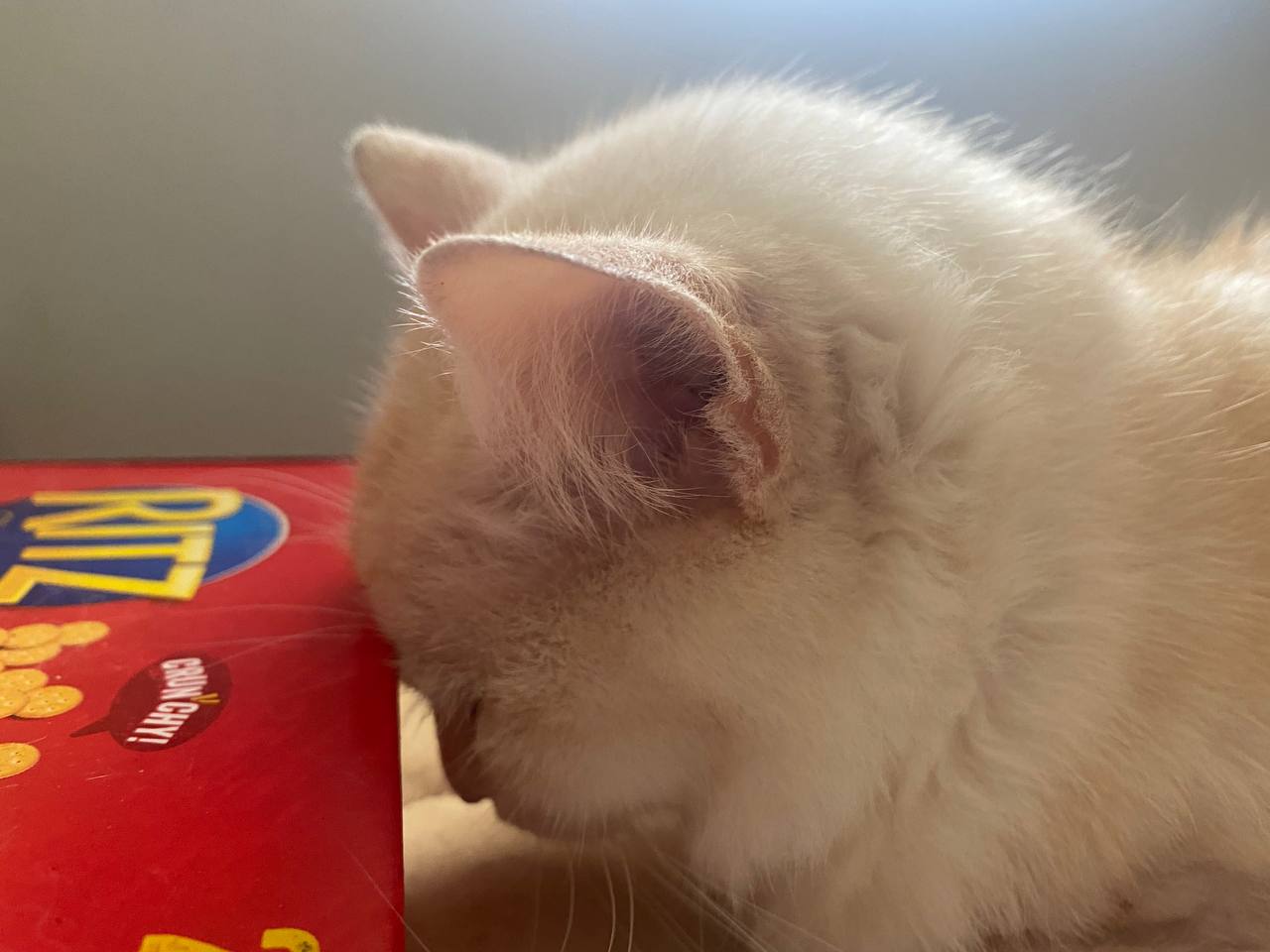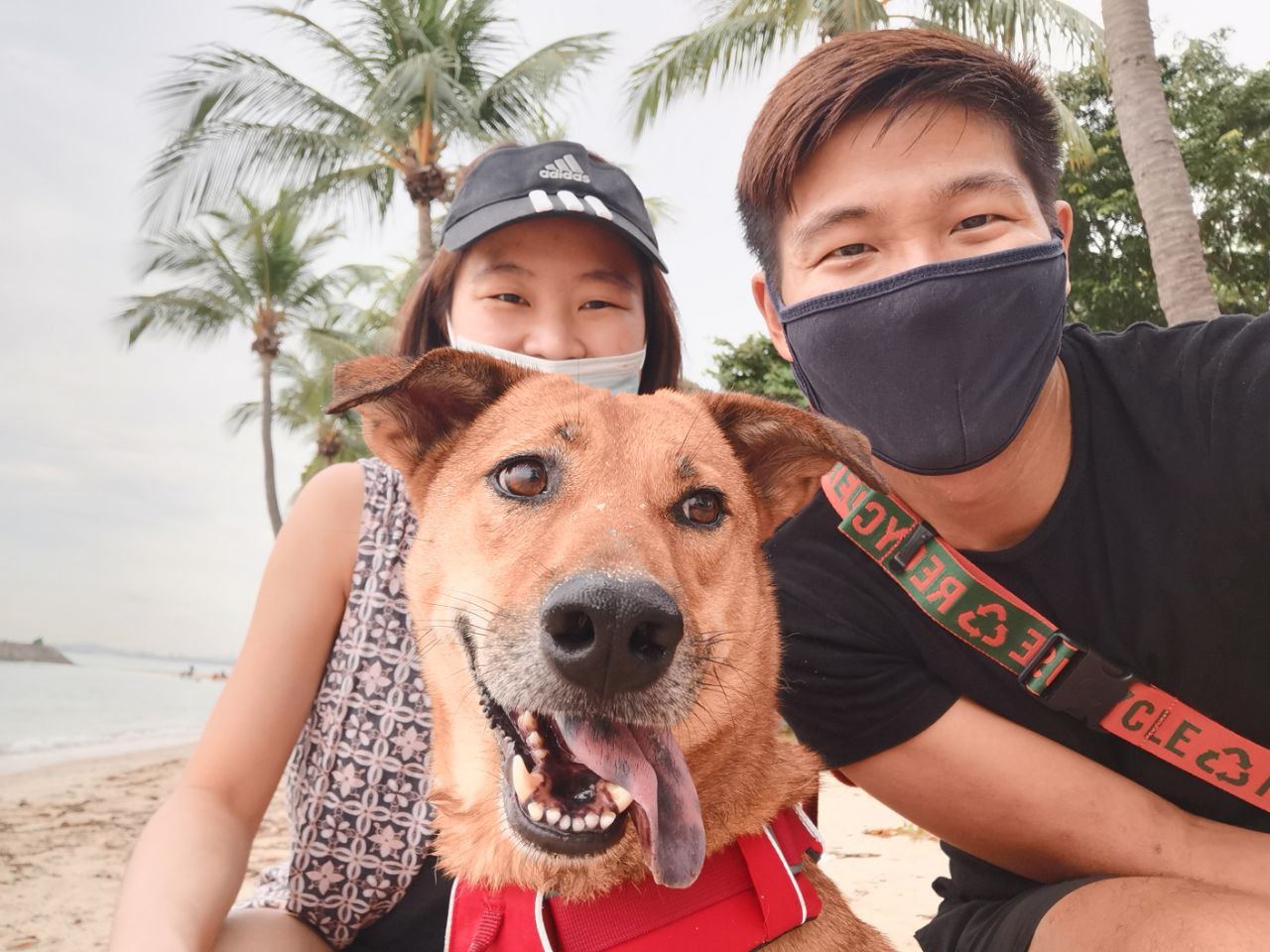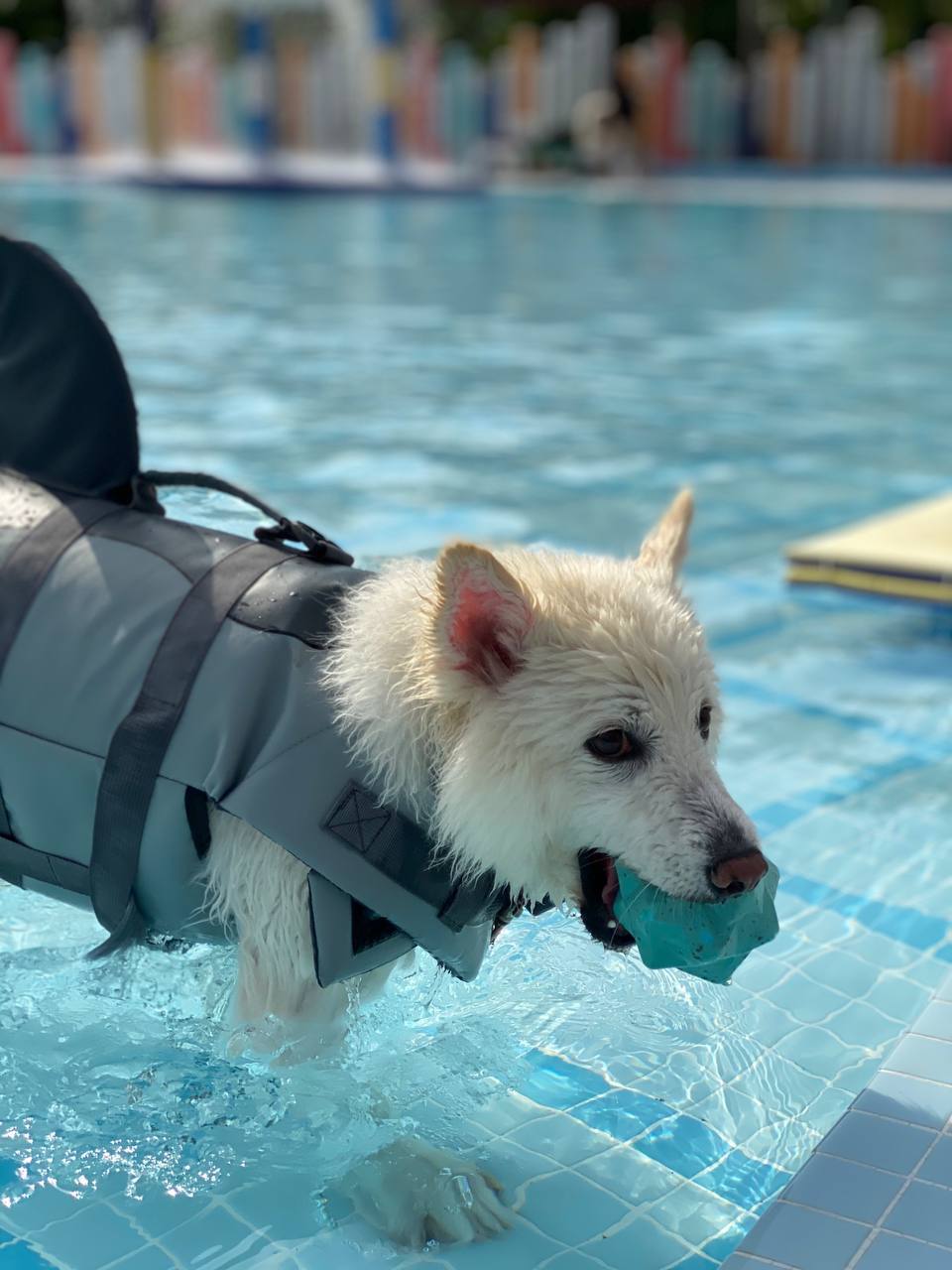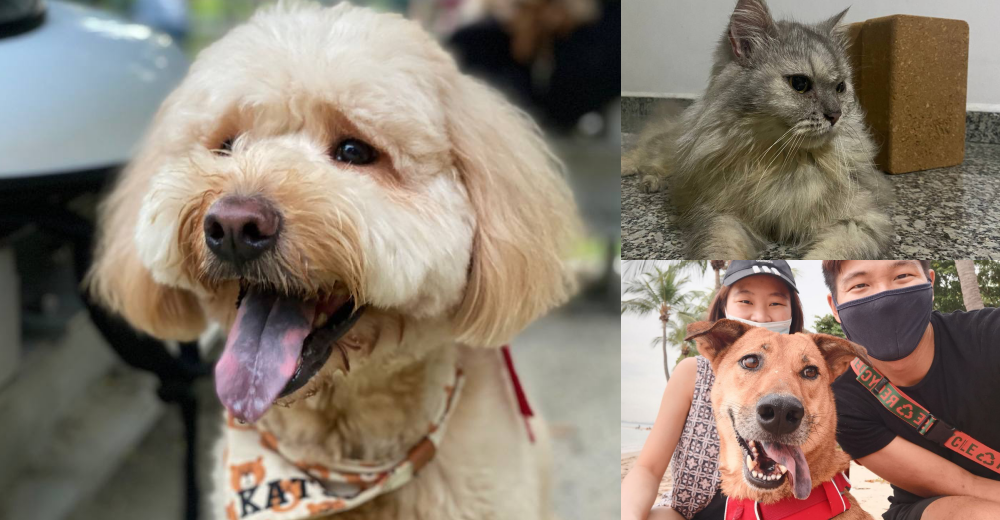Follow us on Telegram for the latest updates: https://t.me/mothershipsg
Over the last two years, as Singapore grappled with the Covid-19 pandemic, my dogs were the happiest they’ve ever been.
Hour-long walks, mid-day snack breaks, frequent belly rubs and of course a full day of human companionship with the family working from home.
I was protecting myself by staying home more, but I never thought about how the virus could affect them too.
About three weeks ago, news of lions in the Singapore Zoo and the Night Safari infected with Covid-19 had me thinking:
“Is it possible that my dogs could contract Covid-19?”
I decided to speak to the Animal Veterinary Service (AVS) and my veterinarian to find out if companion animals are at risk of Covid-19 infection.
Can pets get infected?
 Image by Aisyah.
Image by Aisyah.
In March 2020, the first case of human-to-animal Covid-19 transmission was reported.
An elderly Pomeranian in Hong Kong which reportedly belonged to an infected person at that time tested positive for Covid-19 infection.
The U.S. Centers for Disease Control and Prevention (CDC), said the virus (SARS-CoV-2) that causes Covid-19 can spread from people to animals during close contact.
This includes companion animals like cats and dogs.
So, the answer is yes, it is possible.
Going back to the thought that sparked this topic – the lions in Singapore's wildlife parks contracted the virus after they were exposed to a staff member who tested positive for Covid-19.
The lions displayed mild symptoms such as coughing, sneezing and lethargy, which prompted the AVS to test them for the disease.
Chang Siow Foong, a group director at AVS noted that certain animals are more susceptible to the virus. This includes cats, ferrets, minks and primates.
Nonetheless, the transmission of the virus can occur when an animal is in close contact with an infected person. This is regardless of the environment of exposure.
Since both companion animals and zoo animals live in similar environments – enclosed areas and cared for by humans – the risk of spread to animals is just as likely.
The current spread is, however, still predominantly due to human-to-human transmission, said Chang.
The World Health Organisation for Animal Health (OIE) has also pointed out that the risk of transmission from infected animals to humans is very low.
Thus, testing companion animals for SARS-CoV-2 has not been mandated.
For the same reason, AVS is not pushing to get companion animals vaccinated against Covid-19.
Concerning the wellbeing of pets, current evidence shows that infection with SARS-CoV-2 does not cause severe illness in pets, Chang added.
So, Covid-19 vaccinations for animals are not recommended at the moment.
No need to vaccinate pets right now
My dogs' vet, Pamelia Sim, who is a Veterinary Surgeon at United Veterinary Clinic Pte Ltd, pointed out that there's currently a coronavirus vaccine included in the yearly schedule of vaccines that dogs and cats get.
However, there is currently no evidence that vaccinating pets with that vaccine, intended for protection against enteric coronavirus infection, will provide cross-protection against Covid-19 infection, said the Singapore Veterinary Association (SVA) in a statement made on March. 7, 2020.
In addition, commercially available pet vaccines right now are not licensed for protection against Covid-19.
Companies in the U.S have begun manufacturing Covid-19 vaccines specifically for animals.
One of these companies is Zoetis, a global animal health company that began working on the vaccine after the first pet dog in Hong Kong tested positive for the virus.
The animal vaccine from Zoetis has been administered in numerous zoos in the U.S including Cincinnati Zoo and Botanical Garden in Ohio, and Oakland Zoo in California.
Nevertheless, Zoetis did highlight that the vaccines are being distributed to zoos on an experimental basis.
Mandai Wildlife Group spokesperson told Mothership previously that there are no plans to vaccinate animals in the Singapore Zoo and wildlife parks against the SARS-CoV-2 virus as more understanding of the safety and efficacy of vaccination for animals is needed.
For the same reason, the vaccine is not being administered to companion animals yet.
Are pet owners open to an experimental vaccine?
Speaking as a pet owner, I would say no for now because it is experimental and I wouldn’t want to risk anything happening to my furbabies.
Besides, knowing that animals that are infected with Covid-19 do not suffer from severe symptoms makes me think that the vaccination is unnecessary for now.
 Image by Alfie Kwa.
Image by Alfie Kwa.
And it appears that this is a common sentiment among most of my colleagues who also own pets.
Jonathan, 32, who is an owner of two dogs, said he has had his worries about his dogs catching the virus.
 Image by Jonathan.
Image by Jonathan.
With his wife in the healthcare industry, the couple follows a routine whenever she gets home from work: He will put their dogs in a room away from her until she’s out of the shower.
But Jonathan is against the idea of his dogs getting an experimental vaccine.
“No. I cannot bear the low probability where something might go wrong,” he said.
Aisha, 27, owns three cats and she is also sceptical about getting her furkids vaccinated with an experimental vaccine, even though she's concerned about her cats contracting the virus.
 Image by Aisyah.
Image by Aisyah.
This was especially so when she was a close contact of a Covid-19 case and had to isolate herself at home with her cats. She was worried that she would infect her cats if she tested positive for Covid-19.
Two other colleagues, W (42) and Daniel (33), also expressed their worries about their fur kids, especially since their dogs, being curious creatures, love to sniff everything in their path.
W doesn't want to give his dog an experimental vaccine. He would much rather keep his dog isolated in a room if it were to catch the virus, even though he anticipates that it would be quite a difficult endeavour.
 Image by W.
Image by W.
Daniel, on the other hand, is on the fence about an experimental vaccine.
"I'd probably find out more first. No clear inclination towards a yes or a no."
He added that if his dog were to test positive, he’d avoid crowds and take his dog for walks at late hours.
 Image by Daniel.
Image by Daniel.
Yet another dog owner, K (31), said that she never thought about the possibility of her dog contracting the virus, as there have not been any reports of that in Singapore so far.
She added that if anyone in her home contracts the virus, she would worry about her family's health first before her dog's in this scenario. So, she doesn't think that vaccines are necessary for now, especially if it has not been approved by AVS.
 Image via K.
Image via K.
Protecting yourself and your pet
To protect pets from the virus, owners should practise good hygiene, Sim said.
Owners should wash their hands thoroughly before and after contact with pets and their food. They should also avoid sharing food with the animals, kissing them, or letting them lick other people.
Unwell household members should also limit their contact with their pets, as they would with other people.
Sim said:
“While knowledge about clinical disease manifestations in animals is limited, current evidence suggests clinical signs may include but are not limited to, coughing, sneezing, respiratory distress, nasal discharge, ocular discharge, vomiting or diarrhoea, fever, inappetence, and lethargy.”
She added that these signs are not exclusive to Covid-19 infection, and recommended that owners seek veterinary attention if they notice them.
A veterinarian treating animals with these symptoms will perform a thorough physical examination and take a look at the animal’s medical history to rule out other illnesses that could be responsible for the symptoms.
Vets will also need to know if the pet has been in close contact with a confirmed Covid-19 case, in humans or other animals.
Chang added that if a veterinarian suspects that the animal may be sick with Covid-19infection, the veterinarian will contact AVS.
The organisation will do a follow-up with the owner of the animal and the veterinarian to investigate the potential exposures, conduct further testing and isolate the animal if needed. This procedure is recommended by the OIE.
Any infection of animals with SARS-CoV-2 will be reported to the OIE, and this information is publicly accessible.
If your pet tests positive for Covid-19, U.S CDC recommends that you keep your pet at home, except to get medical care, where your vet allows home isolation.
Owners should take the same precautions recommended for people caring for an infected person at home.
And for cat owners, do not allow your infected cats to roam outside.
While there isn’t a huge concern about pets contracting the virus, little habits can go a long way to keeping them safe.
Follow and listen to our podcast here
Top images by Daniel, Aisyah and W.
If you like what you read, follow us on Facebook, Instagram, Twitter and Telegram to get the latest updates.
